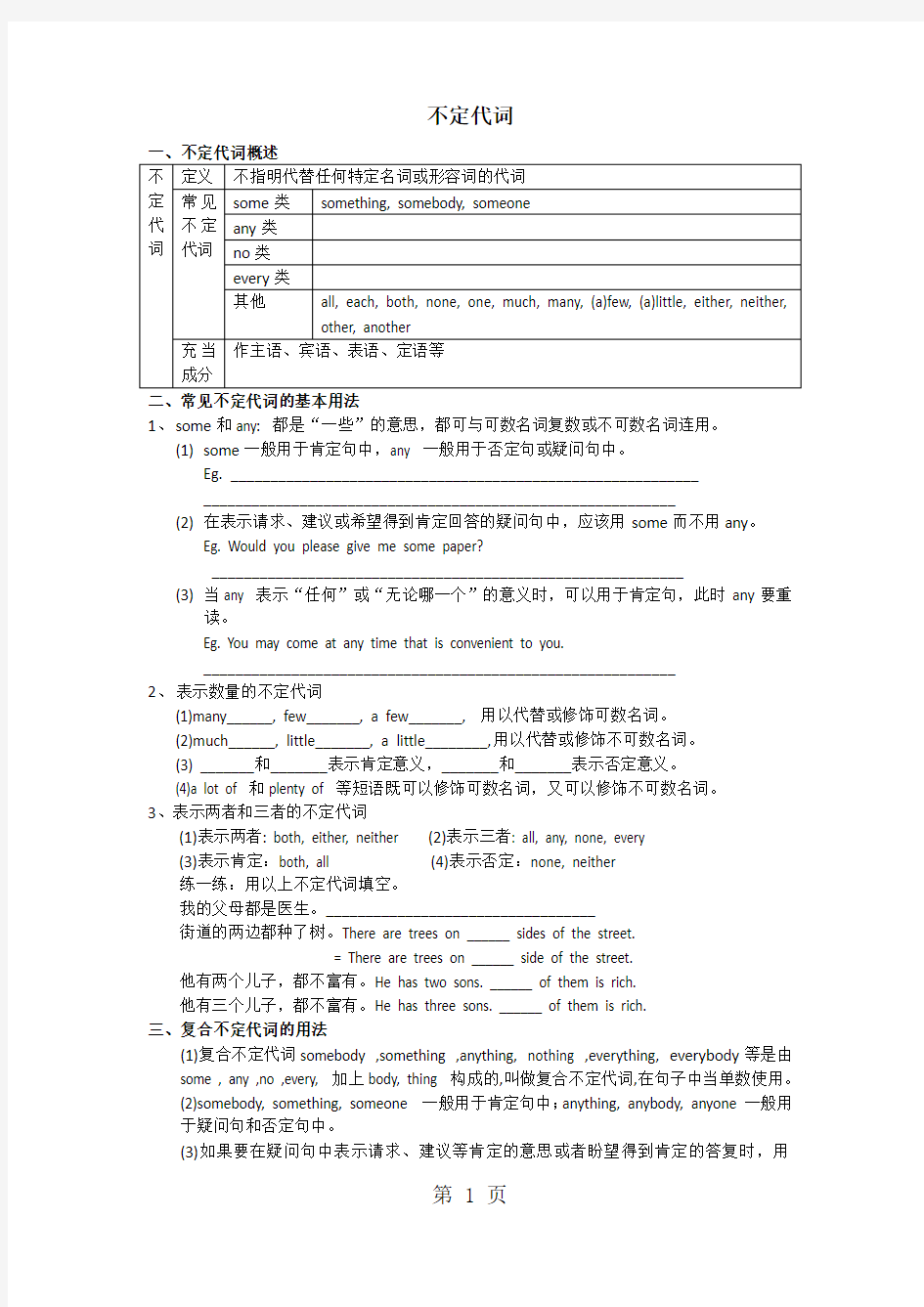
初中英语不定代词讲解及习题(无答案)-精选教学文档
- 格式:doc
- 大小:48.00 KB
- 文档页数:4


不定代词
1、some和any: 都是“一些”的意思,都可与可数名词复数或不可数名词连用。
(1)some一般用于肯定句中,any 一般用于否定句或疑问句中。
Eg. ___________________________________________________________
___________________________________________________________
(2)在表示请求、建议或希望得到肯定回答的疑问句中,应该用some而不用any。
Eg. Would you please give me some paper?
___________________________________________________________
(3)当any 表示“任何”或“无论哪一个”的意义时,可以用于肯定句,此时any要重
读。
Eg. You may come at any time that is convenient to you.
___________________________________________________________
2、表示数量的不定代词
(1)many______, few_______, a few_______, 用以代替或修饰可数名词。
(2)much______, little_______, a little________,用以代替或修饰不可数名词。
(3) _______和_______表示肯定意义,_______和_______表示否定意义。
(4)a lot of 和plenty of 等短语既可以修饰可数名词,又可以修饰不可数名词。
3、表示两者和三者的不定代词
(1)表示两者: both, either, neither (2)表示三者: all, any, none, every
(3)表示肯定:both, all (4)表示否定:none, neither
练一练:用以上不定代词填空。
我的父母都是医生。__________________________________
街道的两边都种了树。There are trees on ______ sides of the street.
= There are trees on ______ side of the street.
他有两个儿子,都不富有。He has two sons. ______ of them is rich.
他有三个儿子,都不富有。He has three sons. ______ of them is rich.
三、复合不定代词的用法
(1)复合不定代词somebody ,something ,anything, nothing ,everything, everybody等是由
some , any ,no ,every, 加上body, thing 构成的,叫做复合不定代词,在句子中当单数使用。
(2)somebody, something, someone 一般用于肯定句中;anything, anybody, anyone一般用
于疑问句和否定句中。
(3)如果要在疑问句中表示请求、建议等肯定的意思或者盼望得到肯定的答复时,用
somebody, someone 或something。
(4) 修饰复合不定代词的形容词或不定式应放在它们的后面。
Eg. He has nothing much to do today.他今天没有多少事情做。
Lucy hasn’t anything important to do. 露西没有任何重要时做。
四、疑难拓展
1、few/a few/little/a little
(1)后接名词的不同。_______和_______后接可数名词复数,_______和_______后接不可数名词。
Eg. There are _______ new words in the text. 课文中有一些新单词。
Can you speak _______ English? 你能说一点英语吗?
(2)表示肯定意义和否定意义的区别。_______和________ 表示肯定,______和_______表示否定。
Eg. I have ________ friends there. I often play with them.
There is _______ meat at home. Let’s buy some.
2、other/others/the other/another
(1)other表示“另一个”的意思,在句中可作主语、宾语或定语,不独立使用,通常修
饰可数名词复数。
(2)others可独立使用,无范围限定。
(3)other和others前面加定冠词the 时表示特指,不加the 表示泛指。The other表示
两个中的另一个,常用于句型”one…the other…”,the others 表示全部其余的人或物。
Eg. I have two brothers. ____ is a doctor; ________ is a teacher.
He is always ready to help _______.
Five of them are in the classroom. What about _______?
(4)another(另外一个,又一个),只能代替或修饰单数名词,可用作主语、宾语或定语,
不独立使用。前面不加冠词。
Eg. Don’t lose heart. Have another try.
(5)Another 后可以跟few 或带数字的复数名词。
Eg. Just think what our town will be like in another few years.
You’d better stay in bed for another two weeks.
3、部分否定及完全否定
Not与不定代词all, both, every等表示全部意义的词连用时构成部分否定;若要表示完全否定,则需要换用none, neither, no 等。
练一练:翻译下列句子。
All of the students like the novel.___________________________________
Not all of the students like the novel. ___________________________________
All of the students don’t like the novel.__________________________________
None of the students like the novel. ___________________________________
4、all, both, each等用作同位语
若用作主语同位语,主语可以是名词或代词;若用作宾语等其他成分的同位语,则宾语等成分必须是人称代词,而不能时名词。
Eg. We all have read it.(all修饰的主语是代词)
The village all have been destroyed.(all修饰的主语是名词)
They told us all to wait here.(all 修饰的宾语是代词)